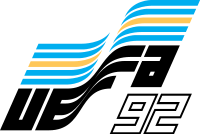UEFA Euro 1992
| Europamästerskapet i fotboll Sverige 1992 | |
|---|---|
|
UEFA Euro 1992 official logo Small is Beautiful | |
| Tournament details | |
| Host country | Sweden |
| Dates | 10 – 26 June |
| Teams | 8 |
| Venue(s) | 4 (in 4 host cities) |
| Final positions | |
| Champions |
|
| Runners-up |
|
| Tournament statistics | |
| Matches played | 15 |
| Goals scored | 32 (2.13 per match) |
| Attendance | 430,111 (28,674 per match) |
| Top scorer(s) |
(3 goals each) |
The 1992 UEFA European Football Championship was hosted by Sweden between 10 and 26 June 1992. It was the ninth European Football Championship, which is held every four years and supported by UEFA.
Denmark won the 1992 championship. The team had qualified only after Yugoslavia was disqualified as a result of the breakup and warfare in the country. Eight national teams contested the finals tournament.[1]
Also present at the tournament was the CIS national football team (Commonwealth of Independent States), representing the recently dissolved Soviet Union whose national team had qualified for the tournament. It was also the first major tournament at which the reunified Germany (who were beaten 2–0 by Denmark in the final) had competed.
It was to be the last tournament with only eight participants, the last to award the winner of a match with only two points, and the last tournament before the introduction of the back-pass rule.
Bid process
On 17 December 1988, Sweden was chosen over Spain to host the event, following a decision made by the UEFA Executive Committee.[2] Spain was at a disadvantage as they had already been chosen to host the EXPO 1992 and the 1992 Summer Olympic Games.[2][3]
Summary
Seven of the eight teams had to qualify for the final stage; Sweden qualified automatically as hosts of the event.[4] The Soviet Union qualified for the finals shortly before the break-up of the country, and took part in the tournament under the banner of the Commonwealth of Independent States (CIS),[5] before the former Soviet republics formed their own national teams after the competition. The CIS team represented the following ex-Soviet republics: Russia, Ukraine, Belarus, Kazakhstan, Uzbekistan, Turkmenistan, Kyrgyzstan, Armenia, Azerbaijan, Moldova, and Tajikistan. Four out of 15 ex-republics were not members of the CIS: Estonia, Latvia, and Lithuania did not send their players; Georgia was not a member of the CIS at the time, but Georgian Kakhaber Tskhadadze was a part of the squad.
Originally, Yugoslavia qualified for the final stage, but due to the Yugoslav wars, the team was disqualified and their qualifying group's runner-up, Denmark, took part in the championship.[6] They shocked the continent when Peter Schmeichel saved Marco van Basten's penalty in the semi-final penalty shoot-out against the Netherlands, thus defeating the defending European champions.[7] The shock was compounded when Denmark went on to defeat the reigning world champions Germany 2–0 to win the European title.[8]
Qualification
Qualified teams
| Country | Qualified as | Participitation secured on | Previous appearances in tournament[n 1] |
|---|---|---|---|
| |
Hosts | 2 February 1990 | 0 (debut) |
| |
Group 1 winner | 12 October 1991 | 2 (1960, 1984) |
| |
Group 2 winner | 13 November 1991 | 0 (debut) |
| |
Group 3 winner[n 3] | 13 November 1991 | 5 (1960, 1964, 1968, 1972, 1988)[n 3] |
| |
DNQ[n 4][9] | 30 May 1992[n 5] | 3 (1964, 1984, 1988) |
| |
Group 5 winner | 20 November 1991 | 5 (1972, 1976, 1980, 1984, 1988)[n 6] |
| |
Group 6 winner | 4 December 1991 | 3 (1976, 1980, 1988) |
| |
Group 7 winner | 13 November 1991 | 3 (1968, 1980, 1988) |
Venues
| Gothenburg | Stockholm |
|---|---|
| Ullevi | Råsunda Stadium |
| Capacity: 44,000 | Capacity: 40,000 |
 |
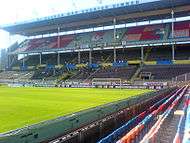 |
| Malmö | Norrköping |
| Malmö Stadion | Idrottsparken |
| Capacity: 30,000 | Capacity: 23,000 |
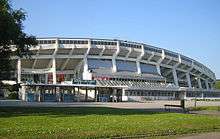 |
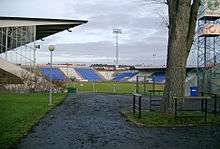 |
Match ball
Etrvsco Unico, a different version of the Adidas Etrusco Unico, was used as the official match ball of the tournament.
Match officials
| Country | Fourth officials |
|---|---|
| |
Gerhard Kapl |
| |
Frans van den Wijngaert |
| |
Vadim Zhuk |
| |
Kim Milton Nielsen |
| |
Rémi Harrel |
| |
Karl-Josef Assenmacher |
| |
Sándor Varga |
| |
Tullio Lanese Pierluigi Pairetto |
| |
Mario van der Ende |
| |
Jorge Emanuel Monteiro Coroado |
| |
Leif Sundell |
| |
Bruno Galler Kurt Röthlisberger |
Match summary
| Date | Time | Match | Stadium | Stage | Team 1 | Result | Team 2 |
|---|---|---|---|---|---|---|---|
| Wednesday, 10 June 1992 | 20:15 | 1 | Råsunda Stadium, Stockholm | Group 1 | Sweden | 1–1 | |
| Thursday, 11 June 1992 | 20:15 | 2 | Malmö Stadion, Malmö | Denmark | 0–0 | | |
| Friday, 12 June 1992 | 17:15 | 3 | Ullevi, Gothenburg | Group 2 | Netherlands | 1–0 | |
| 20:15 | 4 | Idrottsparken, Norrköping | CIS | 1–1 | | ||
| Saturday, 13 June 1992 | No matches scheduled | ||||||
| Sunday, 14 June 1992 | 17:15 | 5 | Malmö Stadion, Malmö | Group 1 | France | 0–0 | |
| 20:15 | 6 | Råsunda Stadium, Stockholm | Sweden | 1–0 | | ||
| Monday, 15 June 1992 | 17:15 | 7 | Idrottsparken, Norrköping | Group 2 | Scotland | 0–2 | |
| 20:15 | 8 | Ullevi, Gothenburg | Netherlands | 0–0 | | ||
| Tuesday, 16 June 1992 | No matches scheduled | ||||||
| Wednesday, 17 June 1992 | 20:15 | 9 | Råsunda Stadium, Stockholm | Group 1 | Sweden | 2–1 | |
| 10 | Malmö Stadion, Malmö | France | 1–2 | | |||
| Thursday, 18 June 1992 | 20:15 | 11 | Ullevi, Gothenburg | Group 2 | Netherlands | 3–1 | |
| 12 | Idrottsparken, Norrköping | Scotland | 3–0 | | |||
| Friday, 19 June 1992 | No matches scheduled | ||||||
| Saturday, 20 June 1992 | |||||||
| Sunday, 21 June 1992 | 20:15 | 13 | Råsunda Stadium, Stockholm | Semi-finals | Sweden | 2–3 | |
| Monday, 22 June 1992 | 14 | Ullevi, Gothenburg | Netherlands | 2–2 (4–5 p) | | ||
| Tuesday, 23 June 1992 | No matches scheduled | ||||||
| Wednesday, 24 June 1992 | |||||||
| Thursday, 25 June 1992 | |||||||
| Friday, 26 June 1992 | 20:15 | 15 | Ullevi, Gothenburg | Final | Denmark | 2–0 | |
Results

All times local (UTC+2)
Group stage
The teams finishing in the top two positions in each of the two groups progress to the semi-finals, while the bottom two teams in each group were eliminated from the tournament.
Group 1
| Team | Pld | W | D | L | GF | GA | GD | Pts |
|---|---|---|---|---|---|---|---|---|
| 3 | 2 | 1 | 0 | 4 | 2 | +2 | 5 | |
| 3 | 1 | 1 | 1 | 2 | 2 | 0 | 3 | |
| 3 | 0 | 2 | 1 | 2 | 3 | –1 | 2 | |
| 3 | 0 | 2 | 1 | 1 | 2 | –1 | 2 |
| 10 June 1992 | ||
| Sweden | 1–1 | |
| 11 June 1992 | ||
| Denmark | 0–0 | |
| 14 June 1992 | ||
| France | 0–0 | |
| Sweden | 1–0 | |
| 17 June 1992 | ||
| Sweden | 2–1 | |
| France | 1–2 |
Group 2
| Team | Pld | W | D | L | GF | GA | GD | Pts |
|---|---|---|---|---|---|---|---|---|
| 3 | 2 | 1 | 0 | 4 | 1 | +3 | 5 | |
| 3 | 1 | 1 | 1 | 4 | 4 | 0 | 3 | |
| 3 | 1 | 0 | 2 | 3 | 3 | 0 | 2 | |
| 3 | 0 | 2 | 1 | 1 | 4 | –3 | 2 |
| 12 June 1992 | ||
| Netherlands | 1–0 | |
| CIS | 1–1 | |
| 15 June 1992 | ||
| Scotland | 0–2 | |
| Netherlands | 0–0 | |
| 18 June 1992 | ||
| Netherlands | 3–1 | |
| Scotland | 3–0 |
Knockout stage
| Semi-finals | Final | ||||||
| 21 June – Solna | |||||||
| |
2 | ||||||
| |
3 | ||||||
| 26 June – Gothenburg | |||||||
| |
0 | ||||||
| |
2 | ||||||
| 22 June – Gothenburg | |||||||
| |
2 (4) | ||||||
| |
2 (5) | ||||||
Semi-finals
21 June 1992 20:15 |
| Sweden |
2–3 | |
|---|---|---|
| Brolin K. Andersson |
Report | Häßler Riedle |
22 June 1992 20:15 |
| Netherlands |
2–2 (a.e.t.) | |
|---|---|---|
| Bergkamp Rijkaard |
Report | Larsen |
| Penalties | ||
| Koeman Van Basten Bergkamp Rijkaard Witschge |
4–5 | |
Final
Statistics
Goalscorers
|
|
Awards
- UEFA Team of the Tournament[10]
| Goalkeeper | Defenders | Midfielders | Forwards |
| |
|
|
|
| |
|
| |
| |
|
||
| |
|
- Golden Boot
 Dennis Bergkamp
Dennis Bergkamp Tomas Brolin
Tomas Brolin Henrik Larsen
Henrik Larsen Karl-Heinz Riedle
Karl-Heinz Riedle
(3 goals each)
Marketing
Slogan and theme song
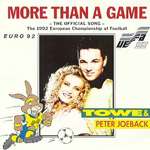
Small is Beautiful was the official slogan of the contest.[5] The official anthem of the tournament was "More Than a Game", performed by Towe Jaarnek and Peter Jöback.
Logo and identity
It was the last tournament to use the UEFA plus flag logo, and the last before the tournament came to be known as "Euro" (it is known as "Euro 1992" only retrospectively). It was also the first major football competition in which the players had their names printed on their backs, at around the time that it was becoming a trend in club football across Europe.
Mascot
The official mascot of the competition was a rabbit named Rabbit, dressed in a Swedish football jersey, and wearing head and wristbands while playing with a ball.[11]
Sponsorship
| Global sponsors | Event sponsors | |
|---|---|---|
| Sweden | ||
Notes
- ↑ Bold indicates champion for that year and Italic indicates host for that year
- ↑ Replaced Soviet Union
- 1 2 As Soviet Union
- ↑ Did not qualify but replaced Yugoslavia, who were subject to sanctions under UN Security Council Resolution 757 and thus banned from appearing. Denmark were runners-up in Group 4.
- ↑ 11 days before start
- ↑ As West Germany
References
- ↑ Chowdhury, Saj (12 May 2012). "Euro 1992: Denmark's fairytale". BBC Sport. British Broadcasting Corporation. Retrieved 11 June 2012.
- 1 2 "Sweden to host 1992 Euro finals". New Straits Times. Reuters. 18 December 1988. Retrieved 16 September 2014.
- ↑ Dietrich Schulze-Marmeling: Die Geschichte der Fußball-Europameisterschaft, Verlag Die Werkstatt, ISBN 978-3-89533-553-2
- ↑ Hughes, Rob (16 October 1991). "Now, the going gets tough". The New York Times. Retrieved 16 September 2014.
- 1 2 Hughes, Rob (10 June 1992). "Confidence and flair: Dutch favored in Euro 92". The New York Times. Retrieved 16 September 2014.
- ↑ "Yugoslav athletes banned". The New York Times. 1 June 1992. Retrieved 16 September 2014.
- ↑ Thomsen, Ian (23 June 1992). "Danes upset Dutch in penalty shoot-out, advance to final". The New York Times. Retrieved 16 September 2014.
- ↑ Thomsen, Ian (27 June 1992). "Upstart Danes upend Germany, 2–0, in soccer final". The New York Times. Retrieved 16 September 2014.
- ↑ "United Nations Security Council Resolution 757 (Implementing Trade Embargo on Yugoslavia)". United Nations. University of Minnesota Human Rights Center. 30 May 1992. Retrieved 18 August 2008.
- ↑ "1992 team of the tournament". Union of European Football Associations. 17 October 2011. Retrieved 17 June 2012.
- ↑ Kell, Tom (1 February 2013). "The weird and wonderful world of Euro mascots". UEFA.com. Union of European Football Associations. Retrieved 5 April 2015.
External links
| Wikimedia Commons has media related to UEFA Euro 1992. |
- UEFA Euro 1992 overview at Union of European Football Associations
- Goal.com: "Euro 2012 History: The 1992 Finals"
- BBC.co.uk: "Denmark's greatest moment", article (24 May 2004)
